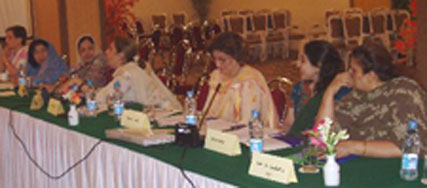This was the first workshop the Training Department has conducted in Pakistan. Institute trainer Nina Sughrue conducted a one-day workshop for women parliamentarians and politicians on "Conflict Management and Negotiation Styles" in conjunction with the Pakistan Institute of Legislative Development And Transparency (PILDAT) on Monday August 7, 2006 in Islamabad.
This was the first workshop the Training Department has conducted in Pakistan. Institute trainer Nina Sughrue conducted a one-day workshop for women parliamentarians and politicians on "Conflict Management and Negotiation Styles" in conjunction with the Pakistan Institute of Legislative Development And Transparency (PILDAT) on Monday August 7, 2006 in Islamabad. The twenty-five participants represented all the major political parties in Pakistan, including Pakistan Muslim League (PML), Pakistan Muslim League Nawaz (PML-N), Pakistan People's Party Parliamentarian (PPPP), Muttahida Quami Movement (MQM), Mutahida Majlas-e-Aamal Pakistan (MMAP), and the Pakistan Tehreek-e-Insaf (PTI).
Executive Director of PILDAT Ahmed Bilal Mehboob stated in his opening remarks that although women can and should play a very vital role in contributing to the resolution of conflict situations and in peace-building, this isn't happening as it should in Pakistan. He stressed the importance of women parliamentarians in contributing to the resolution of conflict situations and said that they can act as mediators at the local, national, regional and international spheres.
The workshop highlighted negotiating skills in managing and resolving differences, and the ability of understanding one's own and the other party´s position and interests in the negotiation process. The participants evinced a keen interest, and actively participated in the group discussions and self-assessment sessions as well as a series of negotiation simulation exercises. The discussion focused on the current conflicts in Pakistan in particular the Balochistan conflict. The women expressed interest in being involved in the resolution of these conflicts.




